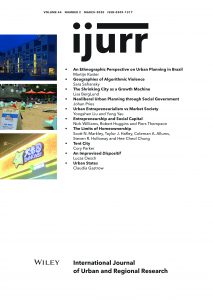In the wake of the 2007–08 housing crash, the Black–white wealth gap reached a staggering 20 to 1. Since then, a growing chorus of influential voices has proposed measures to increase the Black homeownership rate as a means to narrow the gap. Others, however, have argued that the uneven racial geography of home price appreciation necessarily restricts the degree to which Black households, in the aggregate, can build wealth via homeownership. We aim to contribute to these debates by theorizing a racial appreciation gap as a central feature of urban housing markets under racial capitalism, and analyzing how neighborhood racial and income characteristics have structured home price appreciation from before the height of the housing boom (2000–03) to its post‐crisis recovery (2014–16). Focusing on the two counties that encompass Atlanta, Georgia, USA—an area famous for Black prosperity—we find that a neighborhood’s racial composition has a more salient impact on home price change than its income. Results indicate that when a place is marked as Black, this may itself inhibit home price appreciation, suggesting that an enduring racial appreciation gap may limit the potential for Black homeownership to substantively narrow the racial wealth gap.
Details
Written by:
Scott N. Markley, Taylor J. Hafley, Coleman A. Allums, Steven R. Holloway & Hee Cheol Chung
Digital Object Identifier (DOI)
10.1111/1468-2427.12873
About DOI

